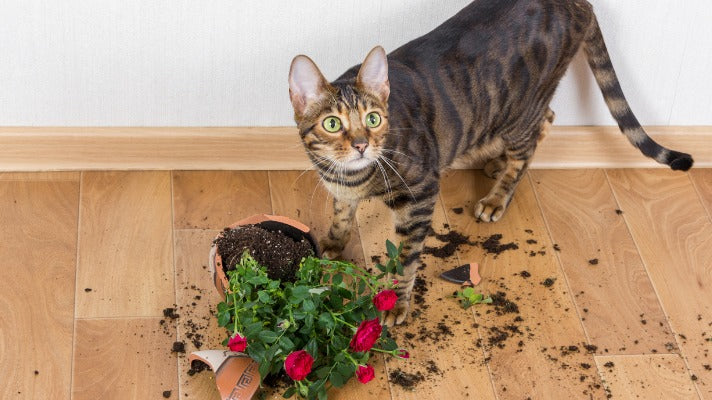
A Bored Cat Can Wreak Destruction on Your Home
Cats are largely independent creatures, opting to do their own thing and spend time on their own. This might lead cat owners to believe that their cats are perfectly fine on their own most or all of the time, but this is not true.
Without enough stimulation, cats can quickly become bored—especially when they’re inside-only cats. And, when a cat is bored, it can quickly become destructive—scratching, biting and attacking things around the home for its own amusement or out of anxiety.
It’s important to keep your cats occupied throughout the day, either by playing with them or by providing ways for them to entertain themselves in your absence.
Identifying boredom-led behavior
Sometimes, your cat’s bored and destructive behavior can manifest in ways that are similar to symptoms of other illnesses. It’s important to understand what your cat is doing and why it’s doing it before taking action.
The first things you might notice are the behaviors that result in damage around the home. Scratching on the furniture, biting and chewing on fabrics and objects and general destruction usually get pet parent’s attention first, since their belongings are at risk.
However, boredom behavior will probably not end there. Your cat might also start showing signs of aggression, hissing or attacking you or others in the home unnecessarily. Your cat might also display a lack of appetite or over-eat, sleep a lot and over-groom.
All of these behaviors might be displayed whether you are home or not. Over time, these behaviors can escalate from merely destroying your home and develop into more serious conditions like depression.
If you notice your cat exhibiting signs of boredom, you’ll want to stop it as soon as possible—not only to save your furniture and belongings, but also to give your cat the enriching life it deserves.
Keep your cat occupied and entertained
You don’t need to spend time with your cat 24/7 or break the bank buying new toys to entertain your cat. Try some of these tips to give your cat new spaces to play in and help it stay physically and mentally engaged all
day long.
- Physical attention: Your cat may not always be in the mood for snuggles, but giving physical attention to it is certainly important. Make sure to give your cat lots of attention when it wants it, whether that’s by petting it, brushing its fur or simply playing with it by throwing a ball or having it chase a flashlight or laser pointer.
- Interactive toys: Interactive toys can be tons of fun for cats because they don’t require you to be home, but they still keep things interesting. Puzzle toys that release treats when they move around are great choices, as are boxes that pop open or make noise when touched.
- Cat trees and towers: One way cats entertain themselves is by climbing and leaping around the home. Providing a vertical cat tree with multiple levels and climbing spaces can get your cat moving and provide it with new spaces to survey the home from. These towers also often have scratching posts, which can serve another of your cat’s instinctual needs.
- Perches near windows: Cats who are stuck inside all day don’t get to exercise their innate desire to hunt, but you can stimulate that intrigue by placing a cat perch next to a window that provides a clear view of outside. It’s even better if you have a bird feeder or squirrel perch in view of the window, so your cat can “stalk" wildlife from indoors. Some cats can sit for hours, simply watching birds flutter to and fro in front of them. (Just make sure the windows remain closed, so your cat doesn’t decide to go on an outdoor hunting adventure!)
- A new friend: If it’s possible, you might even consider adding a new cat to your household to give your older cat a new friend to play with. Make sure your cat is one that will take well to having a new friend around and take time to properly introduce them to prevent territorial issues. If all goes well, the two cats can entertain each other in your absence!
Other causes of destructive behavior in cats
One thing to be mindful of when it comes to destructive behavior and boredom in cats is that some cats are not bored at all. Instead, their symptoms may actually stem from an underlying health issue. Make sure to
keep a close eye on problems like inappropriate urination, lethargy, under- or over-eating and aggression, and take your cat to the vet to rule out health problems if the symptoms continue.


